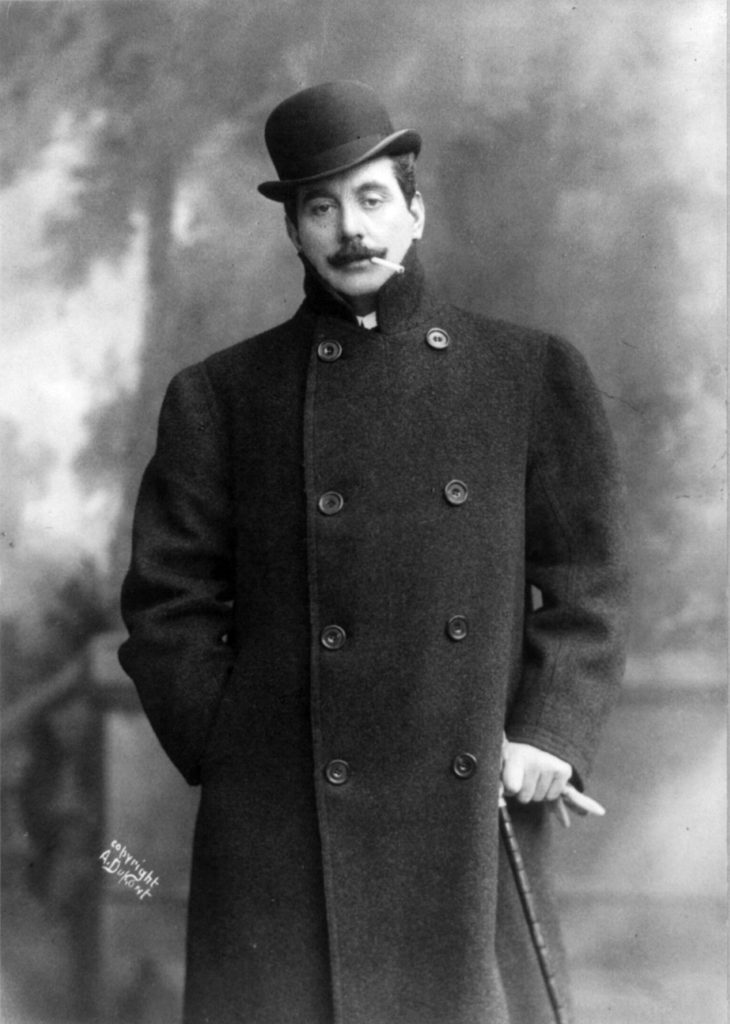
We mark the premiere performance on April 25, 1926 – 96 years ago today – of Giacomo Puccini’s twelfth and final opera, Turandot. The premiere took place at Milan’s storied La Scala opera house and was conducted by Puccini’s friend (and occasional nemesis!) Arturo Toscanini (1867-1957). At the time of the premiere, Puccini himself had been dead for 17 months. And therein lies our tale. Because given the delays in creating the libretto for Turandot, Puccini’s failing health, his leaving the opera incomplete at his death, and the controversy surrounding Turandot’s subsequent completion by the composer Franco Alfano (1875-1954), itwas indeed an opera that almost didn’t happen.
Giacomo Puccini was born in the Tuscan city of Lucca on December 22, 1858, and died in Brussels, Belgium on November 29, 1924, three weeks shy of his 66th birthday. Puccini’s operas remain among the most popular in the repertoire, but among the most critically controversial as well. It is a controversary we will not discuss in this post; rather, I’d direct you to Music History Monday for January 14, 2019. That post – on Puccini’s opera Tosca – wades chin-deep into the critical issues that continue to dog his work.

Sometime in early March 1920, Puccini was having lunch in Milan with the librettists Giuseppe Adami (1878-1946) and Renato Simoni (1875-1952). Discussing stories that could be turned into operas, Simoni brought up the name of the Venetian playwright Carlo Gozzi (1720-1806), and suggested they look over his works. Puccini, who knew something of Gozzi’s “theatrical fables” asked, “What about Turandotte?”
What about it indeed! It was a well-known story: the German poet and playwright Friedrich Schiller (1759-1805) had translated it and staged it in German in 1801, and it had been the subject of an opera composed in 1854 by Puccini’s teacher Antonio Bazzani.
Simoni had a copy of the play in his nearby apartment; he ran home, retrieved it, and gave it to Puccini to read.
Having read (and, we expect, reread!) the play, Puccini wrote Simoni a few days later, instructing Simoni and Adami to prepare a libretto about the haughty Chinese Princess Turandot, emphasizing, according to Puccini:
“the amorous passions of Turandot, who has suffered for such a long time under the ashes of her great pride.”
And then? And then Puccini’s waiting began. Spring turned to summer; summer to fall. In October of 1920, a clearly frustrated Puccini wrote to his friend Sybil Seligman in London:
“I’m not yet working [on Turandot] because they haven’t given me the libretto yet. If they wait much longer I shall have to get them to put pen, paper, and ink-pot in my tomb! What a cheerful idea! [But] that’s how I feel – just like that.”
By December, Puccini’s frustration had turned to genuine worry.…
See the full post, only on Patreon!
Become a Patron!Listen on the Music History Monday Podcast
Podcast: Play in new window
Subscribe: Apple Podcasts | Spotify | Pandora | iHeartRadio | RSS | More
